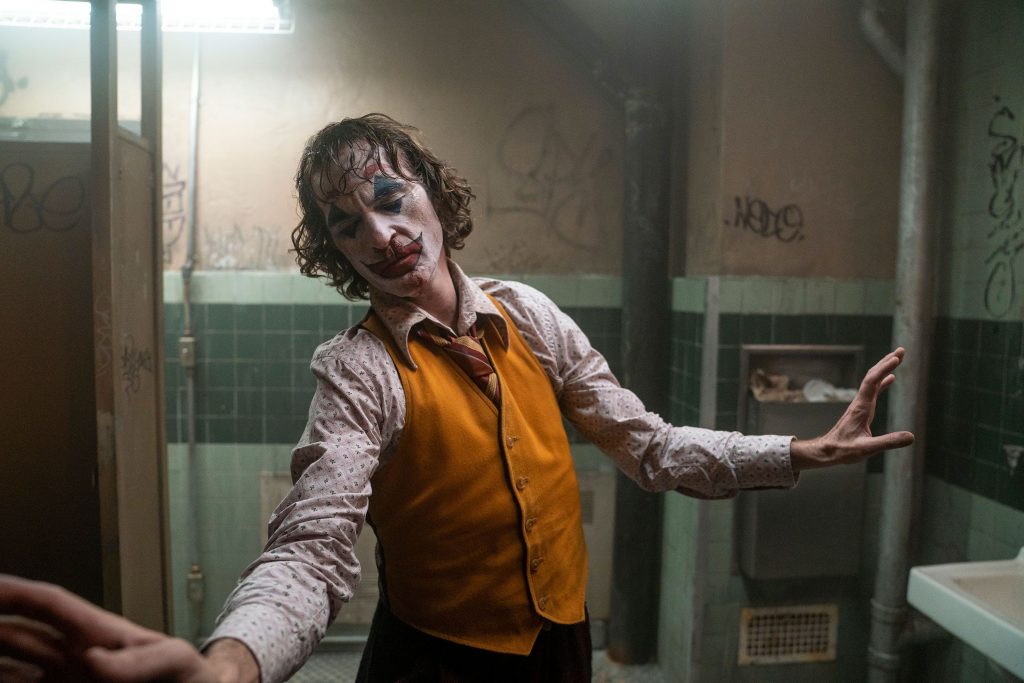By Adam Gage
Joker can often feel like a shallow and try-hard film, but then can also be completely absorbing in moments with an engrossing lead performance, and it somehow ends up feeling simultaneously original and unoriginal. The film is directed by Todd Phillips, who’s record primarily consists of comedies such as the Hangover films, which is reflected in this film through its lack of subtlety, but then it is also completely different with its mish-mash style from classic films and its blatant political allusions.
The film follows Arthur Fleck (Joaquin Phoenix), and his transformation from a working clown to becoming the iconic Batman villain, the Joker. However, while Phoenix’s Joker is just as deranged as previous iterations, he lacks the former incarnations mystery and is much less of a criminal mastermind. The character on display here is meant to be pitied, being a victim of his environment and his mental illness, with a condition that causes him to laugh maniacally in situations that are more upsetting than comedic. He is treated as much like trash by society as the literal rubbish that piles on Gotham’s streets. Phoenix’s performance is certainly one of the best aspects of the film, having shredded a huge amount of weight to appear almost like a skeleton, and matches that feat with acting that is just as physical as it is verbal in its madness.
The strangest thing about the film is the impression it leaves; because it so heavily derives from previous works like Scorsese’s Taxi Driver and King of Comedy, and other older films it feels unoriginal. Then at the same time it has its own viewpoint (though muddled) mixed in with scenes that work well enough to be compelling for it to feel like its own beast. An example of this is in one of its immensely tense 3rd act sequences in which Fleck has completed his transformation into the titular character and commits a public act of violence, after going on an explosive rant on society whilst also commenting on timely subjects like the discourse surrounding modern comedy.
On the other hand, these thematic allusions, while certainly abundant, aren’t expansive or substantial enough and there are certain scenes where the film contradicts its own viewpoint. This can be seen in a particularly unsettling scene, where after a brutal murder takes place, the film seems to make fun of a character with dwarfism. Considering the film is about a monster created by people treating him more than poorly, this scene feels as though it’s at an absolute dissonance with what’s trying to be communicated and seems more in line with what would be in the director’s earlier films.

In terms of style, the film is very overt in its framing and colour pallete, which often works functionally but when combined with its practically-begging-to-be-taken-serious tone it can come off as aesthetic overkill. This can often make it feel like a puffed-up student film that happens to have a large budget. Then again, some moments work well enough to mitigate this issue and keep you within the moment, especially the more violent or hallucinatory scenes.
Regarding discussion of the film itself, there has also been ridiculous, fear-mongering hysteria peddled by the media before the film’s release, stoking the idea that the film and its protagonist might inspire violence in culturally disillusioned white men. This might seem fair from what the Joker does in the film and the fact that he is the focus, but then the alarm falls apart when you consider that the main character has no political viewpoint and is more or less just mentally ill, and the message that is conveyed does not glorify anything.
Maybe what the film is trying to say should be considered, and not assume that a certain type of person is destined to commit heinous acts because of what they see, but because of how they are treated.


